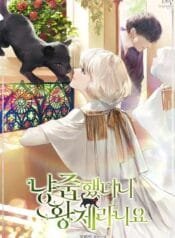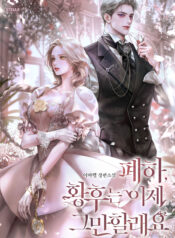The midwife, her eyes reddening after witnessing Tom’s tearful outburst, turned to Atlion.
“P-please, go inside.”
She said, stepping aside after catching a glimpse of his expression. Without a word, Atlion entered the cabin.
“How are you feeling?”
Swan blinked at him with wide, searching eyes before glancing at the empty space where Tom had been. He had seemed to be there, sitting by her side until she closed her eyes. But now he was gone. She started to ask when he had left, but stopped herself.
Instead, her gaze shifted from Atlion to the small, swaddled child in her arms.
A daughter – they had said it was a daughter. Was he unhappy about it? Did he dislike it but hide his feelings? He was the kind of man who, no matter how he felt – displeased or indifferent – would never show it if he didn’t want to. Swan knew that about him. She also knew that he felt no affection for the child that had just been born.
She had no expectations and so there was no disappointment. His eyes betrayed no emotion, not even the faintest glimmer of sentiment. Even the midwife, whom they had met only the day before, had been moved to tears and had comforted Swan with kind words and a gentle touch.
“I think it would be better if you stayed with Tom tonight.”
“Sure.”
“Because the baby and I are already taking up space…”
“Just concentrate on getting better.”
His tone was distant. Swan gave a small nod. A brief silence fell between them as she watched the baby’s tiny lips move gently.
The man also looked at her without emotion. His eyes, fixed on the baby as he rested his chin on his hand, seemed to be looking at something meaningless, as if it were someone else’s borrowed child. Which was why Swan wanted to hide it.
“Have you eaten?”
“Shall I bring you something?”
“No, I just thought you should eat something, sir…”
“I’m fine. I’ll bring you something.”
Swan shook her head, but made no attempt to stop the man as he got up and walked away. His presence alone was enough to make her feel tense, especially when her belly had grown. His expression seemed to reflect avoidance, as if he were looking at something he didn’t want to face or remember.
Something terrible, indescribable. Something irreversible that he would have to carry with him for the rest of his life. Swan blinked as he turned and headed for the kitchen. She looked down at her daughter with pale, tired eyes. Would it have been different if the child had been a boy? No, such thoughts were meaningless.
It wasn’t as if he cared enough about the child to worry about its gender. In truth, the pregnancy itself might have felt like a nightmare. What could be worse than fathering a child with a woman from an isolated, desolate village?
The surprise wasn’t that he’d agreed to marry her after learning of the pregnancy – it was that he hadn’t run away. Swan’s father had done that, as had her mother’s father. Such behaviour seemed almost to be expected.
Since that day, Swan had imagined every day when he would be gone. It wasn’t that she wished it, but whenever she looked at his indifferent face, tears would flow endlessly.
The man, however, thought the tears she shed were simply the result of the emotional weight of her growing belly, tears she cried to get his attention.
***
“I’ll call her Una.”
“Where does that name come from?”
“From my maternal grandmother.”
“Didn’t she die in a fire?”
The man who had been scraping the bottom of his stew bowl looked up. The stew, thick with turnips and potatoes, had been specially prepared by Tom, who had asked a close friend of the widow’s for the recipe. Worried about her meals, since she couldn’t move much after giving birth, Tom had warmed it up for her early in the morning.
Swan nodded as she quietly picked at the contents of the stew.
“You want to name the child after a woman who burned to death?”
His voice was unusually harsh, causing Swan to freeze as she looked at him. The man stared back at her with a rare expression of anger. Swan shivered slightly, then met his gaze.
“She was a good person. She was a respected healer in the village, but there was a misunderstanding…”
“So you’re naming her after a woman who burned to death, a woman who was branded a witch?”
Swan lowered her eyes, unable to find the words to answer. Her grandmother had been a respected healer in the village, even more knowledgeable than the officially recognised doctors.
Tom had told her that. He himself had been saved by her help when he was a child, which had created the bond between him and Swan.
Swan had hoped her daughter would become as skilled a healer. Death had never crossed her mind. Everyone dies, and their stories are often full of sorrow. She hadn’t expected the man to look at her with such intensity, to oppose her with such force. Swan blinked, her face pale as she struggled to take it all in.
“What about Mirabella?”
The man, who had been staring intently for a while, asked again, stirring his spoon. The table was quiet. Swan wondered where the name had come from. It was a beautiful name, but it didn’t seem like one that had come to him by chance.
“How did you come up with that name?”
“Just… a name I know.”
“Someone from your past?”
There was no girl with that name in the village. So it must have been one of the names of women from his past, one of the names that had begun to reappear in his memories. Perhaps he had already recovered his memories. No, it had probably been a long time since that had happened.
Suddenly she remembered the day the rain had come down hard. Was that when it all started? The day she had asked him to marry her… He never looked at the armour with narrowed eyes again after that. Swan softened her gaze, then parted her lips.
“Was she someone you loved?”
He looked at Swan as he chewed the solid pieces. Swan instinctively looked away.
“Of course. I named her that because I liked it.”
He murmured. Swan stared blankly at the table. After finishing his bland stew, he drank some chamomile tea before speaking again.
“It’s a name that suits a blonde child.”
***
“Mirabella.”
Swan repeated her daughter’s name to herself. It was elegant yet mysterious, sophisticated yet charming and delicate. She imagined that as her daughter grew from a toddler to a graceful young woman, the name would still be appropriate. Swan cradled the rolled-up cloth carefully.
“They say it’s a name that suits a blonde child.”
“It seems that the woman your father liked also had blonde hair.”
She stared at the sleeping child. The baby was fast asleep. Swan looked briefly at the baby’s hair, which wasn’t red or black, before she heard the sound of approaching footsteps.
Since then, the faint, constant sound had pierced her heart. When their gazes met, the emotions in her confused eyes were overwhelming. How would Swan appear, etched in the blue of his eyes, like an image carved in glass? She had no confidence. Just because he had nowhere else to go didn’t mean she could claim him as her own.
“Are you asleep?”
He spoke to her with her back turned and her eyes closed. He must have known she wasn’t asleep, which was why he spoke. She wasn’t sure whether to answer or remain silent.
“I’ve been thinking.”
“……”
“I don’t think this is a good place to raise a child.”
The heartbeat that had been pounding faltered. Swan tightened her grip on the corner of the blanket. She didn’t quite understand what was meant by ‘not suitable’. The cabin had always been her home, from the time the tiny child in front of her was just a baby until now. The cabin was her world.
This child, Mirabella, would probably grow up to see the cabin as her whole world, just as Swan had.
Life had been hard, but it would probably be easier for Mirabella than it had been for Swan. Swan wouldn’t leave her side. She wouldn’t leave that easily.
“This cabin, you know…”
“……”
“Swan.”
Instead of biting her lip, Swan gripped the edge of the blanket until it was damp. She opened her eyes. The man’s shadow was leaning towards her and the child. Swan stared at the shadow’s outline with eyes that seemed dry and emotionless.
The man did not love Swan. Perhaps there was a time when he thought he could love her, when he thought he could love at least a part of her. A time when she imagined they could leave the cabin together.
A time when the cabin wasn’t everything. A time when love felt urgent and the longing for it was overwhelming. But what about now? Was it the opposite? She wasn’t sure. Swan remained a distant woman to him, still a woman suffocated by her own desires for him.
By his indifference, by his lack of feeling.
And so she didn’t want to leave the cabin. She wanted to love and be loved, but she knew that she could never be truly loved. She knew her love would never be returned. Now the weight of her hope had shifted.
Swan trusted the person she loved more than she believed in love itself. She loved him, but she understood that her love would never be returned. She would live like this forever. And that was why she didn’t want to leave the cabin. If she lost the cabin, she would lose everything.
“Swan.”






